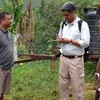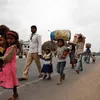As India moves towards 'Lockdown 4.0', CRY organises webinar to understand its effects on children
Based on an online study conducted by the NGO, CRY organised a webinar with a panel of experts to understand the state of healthcare and educational facilities available to children.
India is all set to enter the fourth phase of the lockdown across the country but with reasonable relaxations in certain states. The COVID-19 pandemic has claimed thousands of lives, making it necessary to continue with countrywide restrictions to curb the spread of the virus.
Companies have shut down their offices and enforced a work-from-home structure to contain the spread. Many school-going children have not completed their previous academic year, however, schools are striving to give feasible solutions.
While education now hinges on online classes and e-learning, many parents and guardians are worried about the effectiveness of these classes. Another concern revolves around the safety of the digital space.
Child Rights and You (CRY), an NGO that promotes child development, recently conducted a rapid online study among parents from the states from north, south, east and west India, with a sample group of 1,100 parents who have access to technology.

For over four decades, CRY and its 850 initiatives have worked with parents and communities to ensure lasting change in the lives of more than three million underprivileged children, across 19 states in India.
On May 12, CRY organised a webinar on ‘Understanding the effects of COVID-19 on children’, based on the study they had conducted with a panel of experts — Dr Raj Bhandari, (Member of National Technical Board of Nutrition and Health, GOI), Prof Rekha Sharma Sen (Faculty of Child Development at IGNOU), Swagata Raha (Legal Researcher and Child Protection Specialist), and Rubina Maiti (State Education Officer – UNICEF, UP). The panel was moderated by Puja Marwaha, the CEO at CRY.
Explaining the objective behind the study, Puja Marwaha, the CEO at CRY said, “As India entered the nationwide lockdown on March 24, one of our very first thoughts was to engage ourselves in understanding the overall effect of COVID-19 on the children of our country.”
Though the disease is largely affecting the elderly and people with co-morbidities, with children being spared from the direct health effects of COVID-19, findings of the CRY study indicates that they too have been affected due to multiple side-effects on their physical and psycho-social well-being.
“We are trying to provide essential services to the marginalised children and believe that, soon, we will all be returning to serve the children of our country, and for that, we need to be abreast with how their realities changed during this process,” she added.
When it comes to education, and how schools and institutions have to rehabilitate school lives, Rubina provided very insightful suggestions like having only a few grades coming to school on the same day.
“First and foremost, schools need to employ an intensive back-to-school programme to get back on track,” she says. “We need to develop a framework to get back in shape, and we can start with a staggered entry of students into the campus. We also need to have a disaster management plan so that we can manage the situation in times of crisis.”
According to the study, one in every four (27 percent) parents/primary caregivers, reported non-accessibility of regular healthcare services for children during the lockdown.
To keep children healthy, both physically and psychologically, parents need to be provided with the tools and techniques to monitor children’s behaviour and nutrition intake, and support if they notice any alarming change.
“Good nutrition and good health is an entitlement, not an obligation,” said Dr Rajiv. “The disruption is making the whole health system falling apart with a double whammy – malnutrition and COVID-19.”
Only one in every 10 respondents reported that they were not able to spend much time with their children during the lockdown. The percentage of parents or caregivers having open discussions with their children about the current situation was also considerably higher (54 percent) than ones trying to shield their children from the reality (47 percent).
“In all my career working with IGNOU, little did I know that there’d be a distance education for a toddler,” joked Prof Rekha.
“Right now, institutions are reaching out to children through the various communication channels. Even WhatsApp is becoming a medium to send out activities to parents for their children,” she adds.
Now with all these facilities in place, a question arises – is there a need for physical schools and colleges at all if things can run smoothly just at home? Is there a need to deinstitutionalise education? Swagata Raha highlighted the meaning of accessible education to children with disabilities, children of sex workers, migrant workers, etc.
“Their access to safety is compromised based on the identity they carry,” she explains. “So the solution that we are looking at has to bear in mind all these categories. Unless we proactively have a scheme in place for these children, the future that we are looking at is not a pretty picture.”
Puja concluded the webinar with the hope that it was insightful and provided ideas and thoughts on the state of the children. She says,
“We hope that once the lockdown is over, we will be armed with necessary remedial measures to help India’s children get back on the road to a truly happy, healthy, creative and safe childhood.”
Edited by Kanishk Singh









![[Startup Bharat] This Indore-based security startup is securing your infrastructure data using a hacker’s point of view](https://images.yourstory.com/cs/2/a9efa9c0-2dd9-11e9-adc5-2d913c55075e/startup-bharat-feature-img21550042933391.jpg?mode=crop&crop=faces&ar=1%3A1&format=auto&w=1920&q=75)